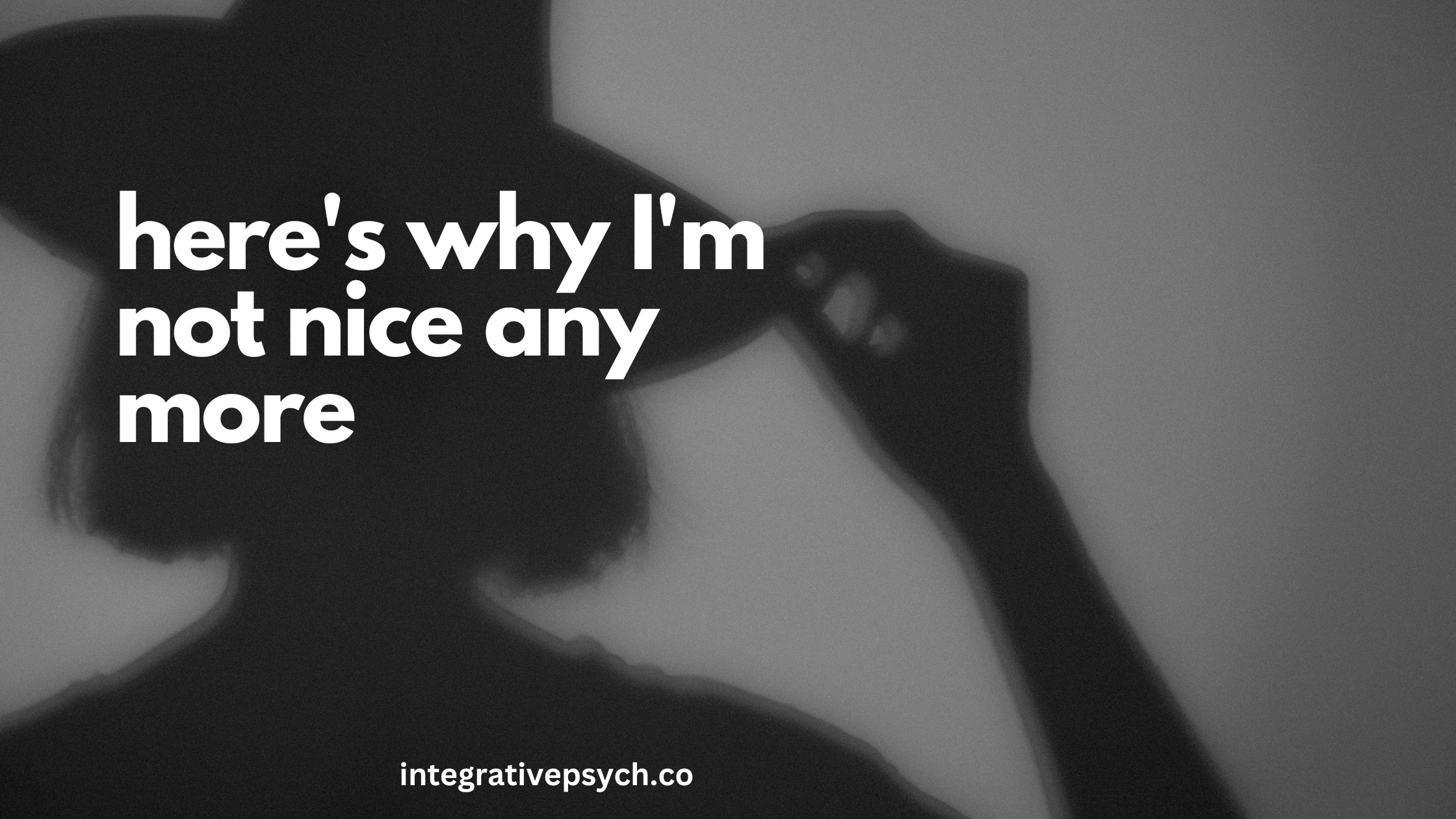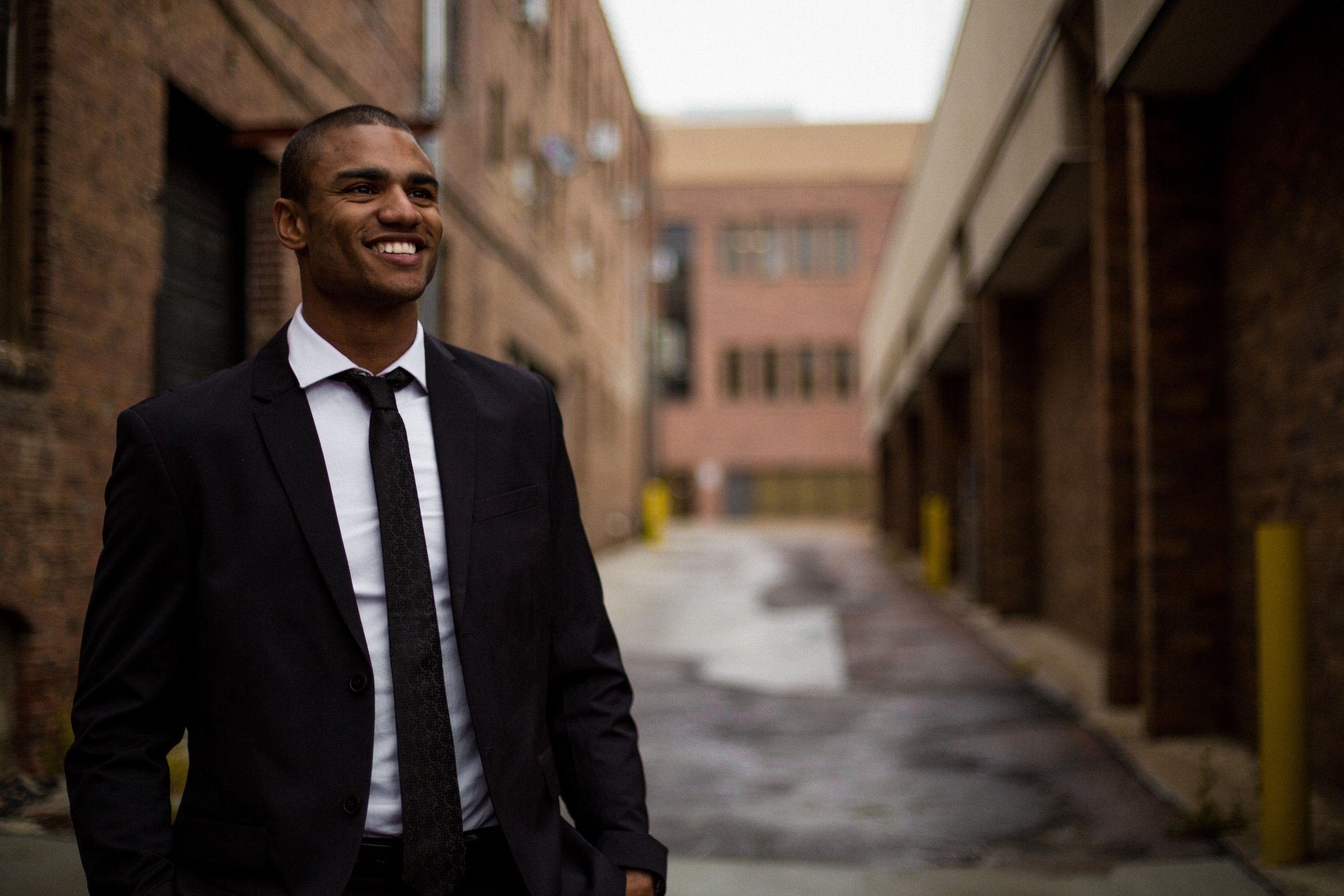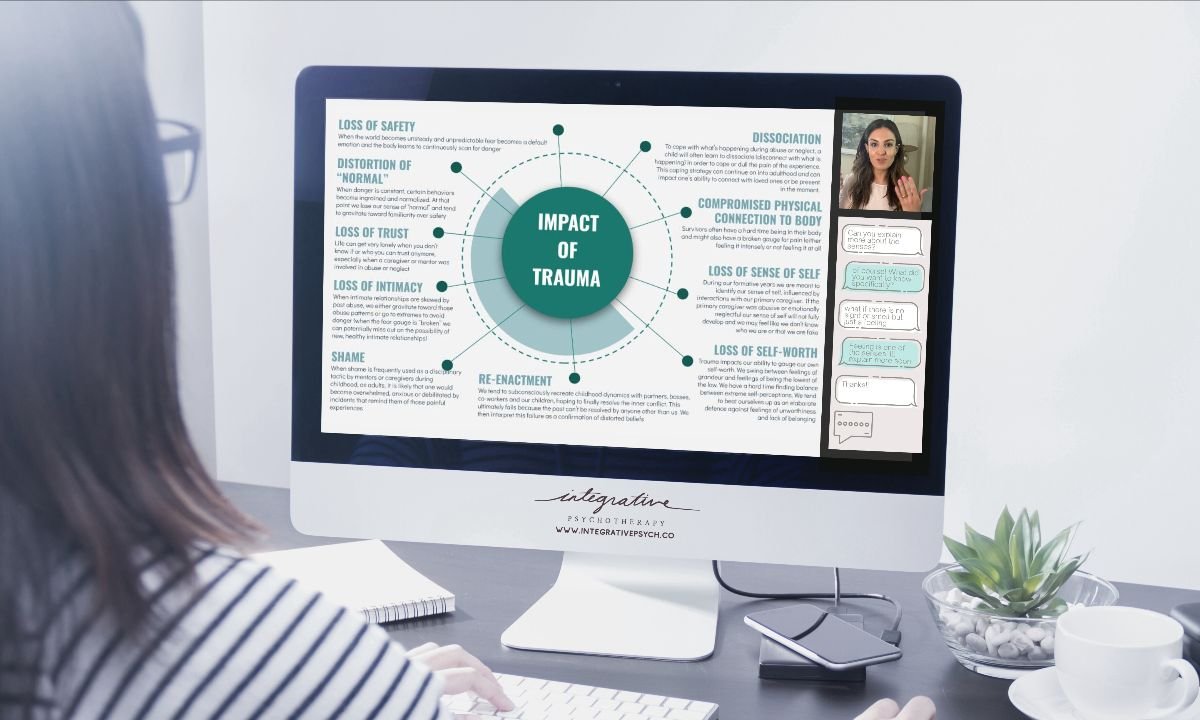Why I'm Not Nice Anymore
There. I said it. I'm not nice anymore.
That was pretty difficult for me to say.
Why? Because I've been taught, as many of you may have, that being nice is the way to go.
Be the nice one,
include everyone,
put a smile on your face,
wipe away those tears.
make the sad people happy .
And that is what I did. But not anymore. Now, I am kind, but I am not nice. It took me a while to realize that being too nice can be a bad thing- for me, and for others.
I learned some hard lessons, and I'm here to share them with you, in case you're also un-learning to be "nice".
The difference between being Kind and being Nice.
There is a big difference between the two.
While we may think that "being nice" is a sweet way of engaging with the world..... if we truly want to be warm, compassionate and well-balanced, the more appropriate word would be kind.
Be Kind.
Kindness is about connection
Niceness is about people pleasing.
I had learned to be nice. To give people hope. To be a listening ear. To see possibly in everyone. To hold peoples pain, struggles and fears.
Because, hey, I'm not just a human, but I am a therapist after all. And I employ other therapists, and I train and mentor therapists around the world. And, I'm a mom.
So, Isn't it my job to be nice?
Nope. Not just isn't it my job, but if I truly wanted to keep doing good therapy work, keep providing good consultation and keep being a mother who models healthy boundaries, I needed to be KIND, not nice.
I had led with niceness for too long. Niceness is what led me to giving too much of my time away, niceness was what kept me up past my bedtime supporting people instead of going to rest up, and niceness is what led me to inviting some of the wrong people into my life- personally and professionally. I saw people's struggles and was there to help them. To help them grow and blossom.
When sugar coating things leads to irritation and self neglect
Over time, I started feeling tired. I was doing other peoples roles and jobs for them. I wasn't focusing on the people who mattered most to be, because my energy was drained. I started feeling irritated and I didn't know why...and then it hit me. I was over-giving and over-investing. I had to shift my focus.
I had it all wrong. My niceness was misplaced. And I had to make a change. And so, just like that, I did.
———————-
Now, do you want hear the good news?
The good news is that as I worked on my boundaries, and shifted from niceness to kindness, I was able to be more intentional in my work. My clients felt safer because I got clearer about what I could and could not do. And I held them accountable (as I was holding myself accountable, too) for the work we were doing.
The progress was enlightening. And I had more focus, energy and intentionality than before.
And in my personal and professional life, the co-dependent relationships fell off like feathers, and the healthy people stayed. The professional and personal friendships blossomed, as there was more balance and joy. I also got and get to model to my son that kindness is what lets us preserve our energy, and ensures that we have healthy and good people in our lives.
---------------
**Human Note** I do need to say that these kinds of behavior shifts aren't a one-and-done, these are behaviors I tend to on the daily. However, when we commit to change, shifts happen =)
----------------
People Pleasers in Long Island
Do You Relate?
Now, turning to your dear reader,
Are you someone who has a tendency to be uber nice. Sugar sweet nice. Extra nice that you bring sunshine and sparkle to every room, place and person?
And, are you starting to feel tired at doing that job, in your personal life and professional life? Keep reading. I explain why you may be this way, and how you can being making a shift! I'm hopeful this information will be helpful to you!
The Connection | The Fawn Response & People Pleasing
Survival Strategies and The Fawn Response
In a past email What frozen iguanas teach us about trauma healing I shared about the Freeze Response. The primary survival strategies are Fight Flight, Freeze, and there's a less common one- called Fawn.
What are survival strategies? We turn to survival strategies when we are faced with a situations that feel threatening and dangerous to us- emotionally or physically. Pete Walker, marriage and family therapist coined the term fawning, in his book "Complex PTSD: From Surviving to Thriving".
What is the Fawn Response?
"Fawning"refers to abandoning your own needs, and tending to others' needs, in order to avoid conflict, disagreement, criticism or disapproval.
Fawn and Safety Seeking . When we "fawn", we are essentially looking to create safety. The thinking process is
"by merging my wishes with your wishes (or by me adopting what you want), I avoid your potential annoyance, frustrating or criticism. I may also be wanting to make things "nice" so that you don't act out, act frustrated or harm a loved one in my life/workplace/social group."
Now, when we mute our own needs, wants, opinions and wishes, we pay a price.
But sometimes that price is worth it. If you tip toe around your boss so that you keep your job (because if you speak up, you will get fired and have no way to pay your bills), it may be smart. But, for the short term.
But for the long term, if you stay in the fawn response and keep repeating patterns ( staying with a toxic boss, attracting chaotic friends), you may want to do the work to shift your patterns so you can improve your life.
Case Example : Meet Joe
Therapy in Long Island for Codependency and People Pleasing
Joe came to me because he was stuck in a chronic fawn response. He would be a "yes man" at work and say "yes" to any request his boss would ask of him. It was ok to begin with but 3 years into working at his law firm, he was starting to break under pressure and feel resentful.
Why Joe became People Pleaser and How To Undo The Programming
Joe had been married to a woman who was very demanding and emotionally volatile. If she didn't get her way, she would shout at the kids, and emotionally neglect them- as a way of acting out. When Joe was married to her (now divorced), he would tip toe around her so that his kids wouldn't be negatively impacted by her abusive behavior.
However, now that the kids were older and he was no longer with her, it was time for him to "graduate" the learned behavior. It did serve a function at the time, as he helped reduce some of the trauma his kids endured, but now, it was time for him to set boundaries, speak up and live a better non-people pleasing life.
Setting Boundaries, Speaking Up & Tolerating Discomfort
Talk Therapy, Somatic Work & EMDR
In Joe's healing, we did some talk therapy to help him understand that he was not weak, but rather, he was creative in how he chose to cope, back then. It was the best he knew how (back then). But now, continuing this behavior was hurting him. Not just at work, but in his personal life as well.
In our counseling sessions, we incorporated somatic work to help him learn to learn about, identify, and confidently implement boundaries (verbal and nonverbal). And we processed some of his body's fear based reactions by using EMDR therapy, so that we dissolved the panic his body had, when he began speaking up.
The mind often knows what needs to be done, but we need to help the body actually feel safe and secure to make the changes.
Joes Healing + Progress
As Joe engaged in his healing, attending weekly therapy at our Long Island office, his body posture shifted to being more confident. Over time, he seemed more embodied and more self assured in who he was and what he was and wasn't ok doing. He had some bold and uncomfortable conversations with his boss, and came up with a more do-able workload so he was able to go back to enjoying his work, and lessen the burn out. He was also able to finally have a more loving, balanced relationship with his girlfriend as he begun asking for what he wanted and needed without just agreeing with her.
—————————
Hello, YOU
If you're thinking of shifting your fawn responses but are scared, let me remind you that it is hard to make a change. It may feel foreign and you may feel a little unsure about the right words to say, or how to shift your energy.
Reach out for help so that you don't go it alone. Share this blog with someone you love who can support you. It can take energy to make shifts, but sometimes, not making shifts can take even more energy.
I do want to remind you to keep your eyes on the bigger picture.
What will you feel like when get clearer on your boundaries?
What will it feel like when you re-align with living with integrity?
How will it feel to say what you truly want and need - with kindness?
Who will you no longer need to care-take for- and how will that help you free your energy?
What kinds of opportunities will you now have energy for?
How will you show up as our best self in your current / future relationships?
What kind of messaging will your children learn from you as they watch your new behaviors/choices?
Anchor into your why and it'll help you stay true to yourself + your values.
Letting go of your fawn response will help you show up for those in your life who are priority for me. It will allow you to realign with your values, and it will help you let go of commitments or relationships that are not balanced or healthy. It's not easy, but doing this work is one of the Most Valuable Gifts you can give to Yourself. If you find that you over-take responsibility for others, if you tip toe, or are not setting boundaries that you need, this is your invitation to self reflect and make a change.
“Wait! I want to know why I am this way”….
For those of you asking..here are some of the reasons you may be this way.
You may have grown up in an environment that avoided conflict -so it feels scary/foreign to you.
You may have been in a parentified child role- needing to tend to your parents'/adults' needs when you were a child
You may be a child of Emotional Neglect Where you may have not had your emotional needs met as a child or in your developmental years.
You may have been in relationship with a narccistic partner, or raised with a narcissistic parent, and experienced some form of gaslighting.
You have grown up or lived with someone with persistent physical or mental health struggles- where your needs weren't noticed or met.
You may have been in a relationship with someone who was violate, erratic or dismissive.
You may have witness violence, alcoholism and lived in a state of needing to be "agreeable" to appease the people around you to be safe.
You may have been in a relationship with an emotionally unavailable person.
Or, you may be part of a group who has experienced discrimination, exclusion, micro-aggression or racism.
You may be in a social group/community where who you are/ your social status, choices or family background are not welcomed, and you feel the need to be "small" to fit in.
Whatever the reason is, your experience is real and valid.
And just because you may have learned to deal by fawning or freezing, (or fighting/fighting) it does not mean you need to continue being that way.
Ignoring your needs can be exhausting.
How to start making a change:
1. The first step...
you can do is to become aware and understand yourself (you're doing that by reading this).
Here is a recorded meditation by Insight Timer called " How to Stop Caring about What People Think and Take Your Power Back". Listen to it!
2. Next....
I'd invite you to get to know what kinds of boundaries you can set.
3. And lastly...
take one small step to setting a boundary.
Yes, change happens in small yet consistent actions.
—————————————————————————-
We are here for you!
Counseling in Long Island, New York
If you're needing some one on one support, we have an incredible staff who are here to support you in taking the steps you need to make shifts in your life, so you can feel better and improve your quality of life!
At our practice, our staff are highly trained in helping you identify your boundaries, develop the skills to set them and to follow through with changes so you can feel better!
We are here to help you heal from your survival strategies, and also help you reduce your symptoms of anxiety, trauma and depression and improve your relationships.
p.s. if you don't live in New York, you can still reach out- we've got amazing colleagues/referrals around the globe and we are happy to connect you with someone good for you/your loved one!
Mental Health Professionals Corner
For those of you asking….
Hey Esther, I'm a therapist, how can I work with you?
Can you tell me about your trauma consultation groups
and CEU approved trauma training?
Sure! If you're a therapist, psychologist, psychiatrist or psychiatric NP or PA, you are in the right place! Yes, we do have a training (CEU approved!) and a trauma therapist consultation group now forming!
Click below to get on the waitlist and sign up form! I'm excited to work with you as you grow and deepen your impact in helping your clients heal.










